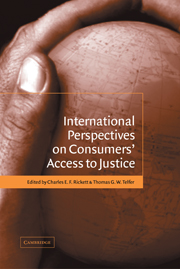Book contents
- Frontmatter
- Contents
- List of contributors
- Preface
- Table of cases
- Table of statutes
- 1 Consumers' access to justice: an introduction
- Part I Perspectives on consumers' access to justice
- Part II Issues in contract and tort
- 5 Standard form contracts in Europe and North America: one hundred years of unfair terms?
- 6 BSE, CJD, mass infections and the 3rd US Restatement
- Part III Services and the consumer
- Part IV Consumer bankruptcy law
- Part V Procedure and process issues
- Part VI Conflict of laws issues
- Index
5 - Standard form contracts in Europe and North America: one hundred years of unfair terms?
from Part II - Issues in contract and tort
Published online by Cambridge University Press: 11 July 2009
- Frontmatter
- Contents
- List of contributors
- Preface
- Table of cases
- Table of statutes
- 1 Consumers' access to justice: an introduction
- Part I Perspectives on consumers' access to justice
- Part II Issues in contract and tort
- 5 Standard form contracts in Europe and North America: one hundred years of unfair terms?
- 6 BSE, CJD, mass infections and the 3rd US Restatement
- Part III Services and the consumer
- Part IV Consumer bankruptcy law
- Part V Procedure and process issues
- Part VI Conflict of laws issues
- Index
Summary
Gli astronomi di Perinzia si trovano di fronte ad una difficile scelta: o ammettere che tutti i loro calcoli sono sbagliati e le loro cifre non riescono a descrivere il cielo. O rivelare che l'ordine degli dei è proprio quello che si rispecchia nella città dei mostri.
Introduction
For slightly more than a hundred years scholars have religiously held that standard form contracts contain terms that are unquestionably unfair as they shift upon customers as many as possible of the risks involved in the transactions, and have predicated that compulsory terms that internalise the risks on the drafter should be imposed. This belief has proved contagious: legislators have enacted laws that ostracise unfair terms; judges and administrative agencies have successfully enforced such laws; comparative law scholars have considered the better law the one that prohibits such unfair terms, and have criticised legal systems where prohibitions of this kind have not existed. The purpose of this essay is to show that the traditional belief can no longer be accepted without question. A two-step argument suggests this. First, each decision on fairness or unfairness of a standardised term is a proxy for the decision-maker's choice of how to allocate the costs that society ought to bear in the face of the materialisation of the contractual risk at stake. Secondly, a law that ostracises certain terms for being unquestionably unfair will make society bear unnecessary costs at any time when a decision of fairness would minimise societal costs.
- Type
- Chapter
- Information
- International Perspectives on Consumers' Access to Justice , pp. 101 - 127Publisher: Cambridge University PressPrint publication year: 2003
- 1
- Cited by



